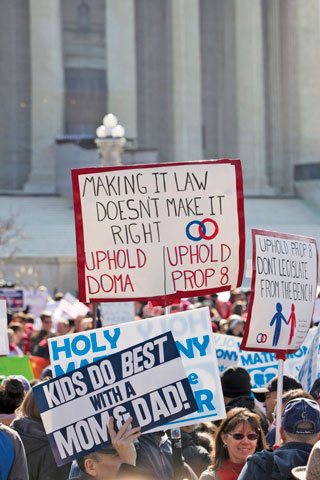
People demonstrate outside the Supreme Court building in Washington March 26 as justices hear arguments in a case challenging California’s same-sex marriage ban. (CNS/Nancy Phelan Wiechec)
About 10 years ago, during a friendly discussion about marriage equality, a gay colleague convinced me that legal marriage for same-sex couples was unattainable, given then-current public opinion. Instead, he argued, activists should work toward more incremental successes, such as legalizing civil unions or, say, removing the words "intrinsically disordered" from the catechism.
Boy, was he wrong.
OK, so maybe "intrinsically disordered" is still in the catechism. But public opinion on marriage equality has shifted seismically in the past decade. Most national polls now find a narrow majority of Americans in favor of legal marriage for gays and lesbians -- with even stronger support among younger generations.
That's a radical change from 1996, when Congress passed the Defense of Marriage Act (DOMA). Back then, only a quarter of Americans supported marriage equality, according to averages of national polls reported by The New York Times.
Of course, DOMA -- which allowed states to refuse to recognize same-sex marriages -- is no more, having been found unconstitutional by the Supreme Court this year. Meanwhile, the number of states recognizing same-sex marriage continues to grow, though, sadly, my own state, Illinois, has not yet passed such legislation.
My former colleague, I'm sure, is happy to have been wrong and most likely joins other lesbian, gay, bisexual and transgender folks and their supporters in cheering this societal change. But they're not the only ones with their fingers in the wind.
Opponents of same-sex marriage, who consider themselves defenders of so-called traditional marriage, know how to analyze poll data, too. So it's not surprising that there has been a noticeable revision to their arguments.
Sure, some still argue that homosexuality is a sin, indeed an abomination, and that anyone who is gay is to be despised. Others are less harsh, pointing out the difference between homosexual orientation and acts, judging as sinful only those who act on their "preferences." Love the sinner, hate the sin, as it were.
But an increasing number of "traditional" marriage supporters are taking a different tactic. They're not talking about gay people at all -- or if they are, it's only to voice newfound support for LGBT folks.
(On a good day, I charitably hope such support is real, perhaps born out of their experiences and relationships with LGBT friends or family. On a bad day, well, I'm cynical ... )
It's not about gay people anymore. It's about the children.
"This issue is not about homosexuality at all. It is about whether marriage is a reality that not only unites a man and a woman with each other, but with any children born from their union," William B. May said in a blog interview in September.
May, president of Catholics for the Common Good, helped lead the fight for the now-overturned Proposition 8 in California. In his book, Getting the Marriage Conversation Right: A Guide for Effective Dialogue, he argues for a definition of marriage that is not "adult-centric," but rather exists to unite children with their biological moms and dads.
As the parent of two children not born to me, I understandably question a definition of marriage that wouldn't include my own union with my husband -- not to mention those marriages of men and women that, for whatever reason, don't include children at all.
Yet when I pose this question to those who defend traditional marriage in this way, they are usually very supportive of adoptive parenting, seeing couples as almost heroic for creating families by adopting children who need parents. Straight couples, that is.
To be honest, I find these arguments logically problematic. It seems to me that not opposing legal marriage for adoptive families (two "adult-centric" folks with children not born to them) but doing so for LGBT families (two "adult-centric" folks with children not born to them) reveals that the real problem for defenders of "traditional" marriage is still homosexuality.
The new "spin" may be that it's about the kids, but it's really about homosexuality.
Interestingly, May actually points to the desire on the part of adopted individuals to search for their biological parents as evidence for his argument. While it's true that wanting a connection to one's biological ancestors is an important identity issue, it doesn't necessarily follow that the marriage of non-biological parents should not be legally recognized.
Which, of course, isn't what May is saying. He surely knows that to oppose marriage for adoptive straight parents would be political suicide. But, increasingly, so is opposing marriage for gay and lesbian couples.
When even the pope is encouraging Catholics to follow God and "endorse the existence of [gay and lesbian people] with love" rather than "reject and condemn" them, it's clear that homophobic arguments just aren't going to work anymore. But neither will defending marriage as an institution only for children and their biological parents.
[Heidi Schlumpf can be found at Facebook and on Twitter, where you can "like" and "follow" her.]




